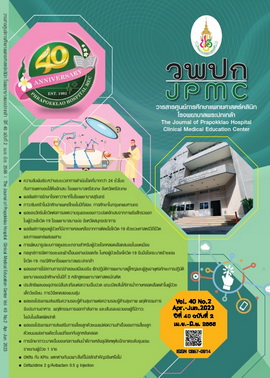Characteristics of Depression in Second Year Medical Students: A study in Bangkok
Main Article Content
Abstract
BACKGROUND: Depression is one of the most common mental illnesses that decrease quality of life in medical students worldwide. This article focuses on depression in Thai second-year medical students; whose learning environment is different from those in clinical years; and aim to contribute to proper interventions of depression in second-year medical students.
OBJECTIVES: (1) To find prevalence of depression in second year medical students (2) To find associated factors of depression in second year medical students
METHODS: A cross-sectional study was performed at the Faculty of Medicine Siriraj Hospital, Mahidol University, Thailand. The Patient Health Questionnaire-9 (PHQ-9), Thai version was applied to explore prevalence of depression in second year medical students. The selected associated factors, including interpersonal relationships, mindfulness, and self-esteem were determined using peer and family relationship questionnaire, Thai version of the Philadelphia Mindfulness Scale (PHLMS) and Thai version of Rosenberg’s self-esteem scale, respectively. Analysis was done using risk estimation by applying a contingency table and univariate logistic regression.
RESULTS: Among 275 second year medical students participating in this study, 71 (25.8%) had positive screening for depression. Four associated factors were significantly correlated with lower PHQ-9 scores. These factors included (1) a personal counselor or peer support (OR=0.40, 95%CI [0.21,0.75], p=0.004); (2) a good family relationship (β=-0.05, p=0.002); (3) a higher score in the Thai version of the Philadelphia Mindfulness Scale (PHLMS) (β=-0.12, p<0.01); and (4) autonomy in the medical student’s decision to study medicine (OR=0.36, 95%CI [0.16,0.83], p=0.01).
CONCLUSIONS: The prevalence of depression among Thai second year medical students were higher than that of the general population (18.4%). Several factors were associated with a lower PHQ-9 score, including having a personal counselor or peer support, autonomy in their decision to study medicine, having a good family relationship, and having mindful thoughts.
Article Details

This work is licensed under a Creative Commons Attribution-NonCommercial-NoDerivatives 4.0 International License.
References
World Health Organization. Global and regional estimates of prevalence. Depression and Other Common Mental Disorders: Global Health Estimates 2017;8-9.
Graber JA, Sontag LM. Internalizing Problems During Adolescence. In: Lerner RM, Steinberg L. Handbook of Adolescent Psychology. John Wiley & Sons Inc; 2009. p. 642–682.
Kaewkanta P, Rungreangkulkij S. Prevalence of Depression in Higher Education Students In Chiangrai Province. Nursing Journal 2015;42(4):48-64.
Rukkhajeekul S. Depression and Suicidal Behaviors among Naresuan University Students.J Psychiatr Assoc Thailand 2013;58(4):359-370.
Phanpanich P, Manwong M, Vongsuphakphan P, Vongsuphakphan L. Depression in the First to Third Year Medical Students of College of Medicine and Public Health, Ubonratchathani University.Srinagarind Med J 2021;36(3):287-294.
Limsricharoen K, Handee N, Chulakdabba S. Prevalence and Associated Factors of Depression in Second to Sixth Years Medical Students, Faculty of Medicine in Thailand. J Psychiatr Assoc Thailand 2014;59(1):29-40.
Chanralaksana N, Thaweekoon T, Sangon S. Factors Predicting Depression in Secondary School Students. The Journal of Psychiatric Nursing and Mental Health 2013;29(2):128-143.
Kroenke K, Spitzer RL, Williams JBW. The PHQ-9. Journal of General Internal Medicine 2001;16(9):606–613.
Lotrakul M, Sumrithe S, Saipanish R. Reliability and validity of the Thai version of the PHQ-9. BMC psychiatry 2008, 8:46.
Wongpakaran T, Wongpakaran N. A comparison of reliability and construct validity between the original and revised versions of the Rosenberg Self-Esteem Scale. Psychiatry Investig. 2012 Mar;9(1):54-8.
Pongpetra, S. Factors Affecting on Interpersonal Relationship with Friends of the Fourth Level, Secondary Grades 4-6 Students at Sarasas Ektra School in Yannawa District, Bangkok. Master Thesis, M.Ed. (Educational Psychology). Bangkok: Graduate School, Srinakharinwirot University 2010. Advisor Committee: Assist. Prof. Dr. Pasana Chularat , Assoc. Prof. Waythanee Greethong.
Silpakit C, Silpakit O, Pattaraphorn P. The validity of Philadelphia Mindfulness Scale Thai version. Journal of Mental Health of Thailand 2011;19(3):140-147.
Lamaisaard Y, Sangsuwan T, Chanyeam K, Jatchavala C. Depression Among First-Year University Students in Restive Areas of Southern Thailand during COVID-19 Pandemic. Suranaree J. Sci. Technol 2021;29(5):070054(1-9).
Kaewpornsawan T, Tuntasood B. The Prevalence of Depression in 2nd Year High School Students in Bangkok. J Psychiatr Assoc Thailand 2012;57(4):395-402.
Auerbach RP, Bigda-Peyton JS, Eberhart NK, Webb CA, Ho MH. Conceptualizing the prospective relationship between social support, stress, and depressive symptoms among adolescents. J Abnorm Child Psychol 2011;39(4):475-87.
Creswell JD. Mindfulness Interventions. Annual Review of Psychology 2017;68(1):491–516.
Sverre KT, Nissen ER, Farver-Vestergaard I, Johannsen M, Zachariae R. Comparing the efficacy of mindfulness-based therapy and cognitive-behavioral therapy for depression in head-to-head randomized controlled trials: A systematic review and meta analysis of equivalence. Clinical Psychology Review. 2023;100:102234.
Roemer L, Orsillo SM. Mindfulness: A promising intervention strategy in need of further study. Clinical Psychology: Science and Practice 2003;10:172-178.Available from: https://reader.elsevier.com/reader/sd/pii/S0272735822001192

